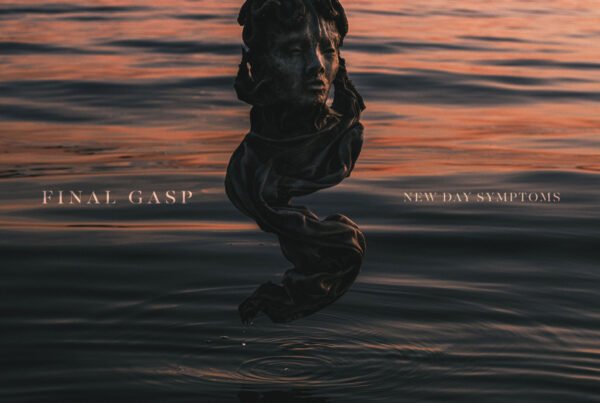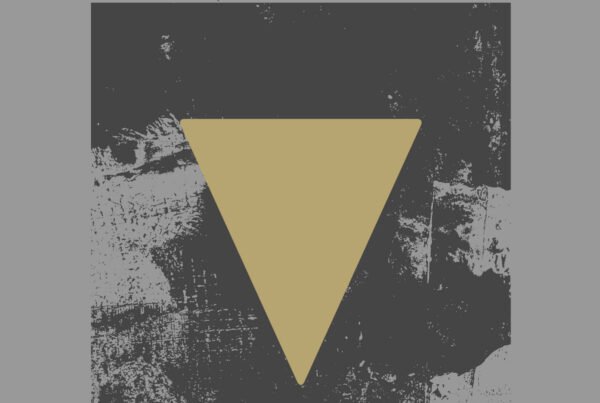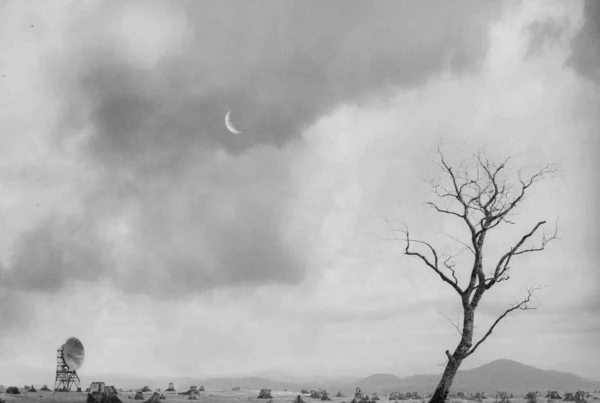Humanity’s selfishness acts as the foundation for a welcome and industrial return for Pharmakon on fifth album Maggot Mass.
Release date: October 4, 2024 | Sacred Bones Records | Bandcamp | Instagram
Discussing the jungle in the 1982 documentary Burden of Dreams, Werner Herzog called nature ‘vile’. His famous quote, ‘The trees here are in misery, the birds are in misery. I don’t think they sing, they just screech in pain’ put forward an image of suffering experienced throughout the natural world. Within the human world however, we see and hear similar misery across the world, whether it be the urban jungle or rural expanse. The interactions between the human and the natural world only act to highlight our lack of ability to coexist with it: whether it’s the deforestation of the very jungle Herzog experienced, monocultural farming techniques flooded with chemicals, or the overwhelming butchery of the meat industry. On Maggot Mass, her first album since 2019’s Devour, Pharmakon delves into the selfishness of the human condition and the inherent suffering within it.
While even Herzog was full of admiration for the jungle, he loved it against his better judgement. That judgement is the human judgement, witnessing anything through an idea of order, free will, and the need to be at the top of the food chain. Pharmakon’s attitude removes this ideology of putting humanity as the focus above all nature. Ironically, her approach remains technological, with roaring electronics and distorted vocals putting her radical environmentalist approach across. Compared to her previous output, though, it has a more primitive industrial style, inspired by punk with its direct delivery and pointed lyrics.
In describing the album, Pharmakon states:
‘If our value were instead determined by our contribution to the ecosystem, who could claim that a human is more valuable than a maggot? Maggots recycle death into life, breaking down matter and nourishing new growth. They transform into flies, pollinating plants and sustaining the Earth’s flora. In contrast, humans pollute rather than pollinate, with a select few profiting from exploitation at the expense of biodiversity and the well-being of many.’
This disdain for humanity, beginning from the self, is the real foundational aspect for the whole of Maggot Mass. From the opening track and single “Wither and Warp”, she uses dream-logic to see herself as rotting matter feeding the Earth, an idea which could work outwards to the rest of the species. Opening with the sampled sounds of flies buzzing, you’re immediately plunged into a world of oppositions when the first beat hits. The buzzing is juxtaposed by mechanical scraping and pulsing synths, growing larger through each bar. The vocals are immediately clearer and deeper than her previous works, a measured and fully formed poetry of anger. The well intonated but still distorted snarl recalls the classic vocals of Nivek Ogre, a master of theatrics and industrial storytelling himself.
Continuing the theme of decomposition, “Methanol Doll” challenges the idea of traditional burial or cremation as pointless, put in a plastic bag as ash or left to lay in a box as a methanol doll. Instead, a plain burial, as dramatized by the album art, allows the body to return to the earth. Pharmakon wishes ‘let me rot’, becoming like the aforementioned maggot to help sustain the Earth’s flora by becoming one with the ground. The pulsing beats also call to mind the noisier songs produced by Skinny Puppy, except dialling up the ferocity and noise with influence of the power electronics and death industrial that has formed Pharmakon’s sound until now. The percussive beats vibrate the cores of buildings, while the intense vocals go from a loud talk to biting squeals that take the paint off the walls.
“Buyer’s Remorse” moves somewhat away from the ecological themes throughout but remains a pointed and vitriolic assault on the human condition, in this case the inherent greed of our capitalist society. This is the first sign of the classic Pharmakon vocals, more of a high-pitched scream than the lower register up to this point. The intensity remains constant but there’s a bit more aggression on top of the considered approach to start the album. While the musical influence of punk is hard to discern in the noise of the album, not counting bands like Throbbing Gristle, “Buyer’s Remorse” is reminiscent of the soundscapes produced during some of Crass’s more experimental periods. While a more overwhelming, electronic offering, the noisy canvas underneath the angered vocals, calling out the rich and powerful’s influence on our economy and environment as lines like ‘oceans of wealth feed rivers of shame’, could just as easily have appeared on Mortarhate Records as Sacred Bones.
“Splendid Isolation” finds Pharmakon’s voice washed in effects, flickering across a consistent but texturally much thinner beat. The echoes of her shouts fill the background space while the intensity of the production takes a back-seat. The sound itself feels isolated, a much sparser section of the album engineered to highlight the pure sound of Pharmakon’s voice. It’s an intriguing difference in production, again bringing to mind more primitive artists from earlier days in the noise scene.
The theme of nature and our relationship with the natural world was notably explored before on 2017’s “No Natural Order”, where Pharmakon discusses humanity’s inability to ‘transcend all of our instincts’ as we are instead ‘just animals lost in a confused dream’. Fast forward seven years to its spiritual sequel, “Oiled Animals”, and humanity’s role is less that of something lost and more an active and willing participant in destruction. While ‘oiled animals are flushed from their dens’, humanity instead decides to ‘dominate, domesticate, eradicate, and procreate’. As the longest song on the album, it’s a fitting and formidable climax – a winding soundscape of grinding beats, machinery-like whirring, Pharmakon’s varied but always gruesome vocals, and a range of noises including what sounds like the breathing of a robotic toad and the sounds of hammering metal.
The juxtaposition of Pharmakon’s primitive, industrial electronic nightmare with the misanthropic environmentalism makes Maggot Mass an enthralling journey of human’s amensalistic relationship with the natural world. Throughout pulsing beats and all of Pharmakon’s angered tones, we’re given a smack in the face to confront our own position within this space, whether it be our buying choices or through our own mortality. If nature in the jungle is vile, then what Pharmakon highlights within human nature is something indescribable.






